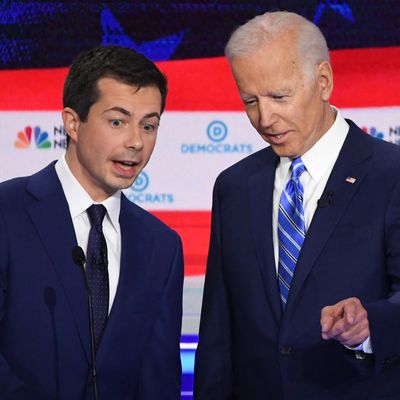
One of the slowly emerging developments in the 2020 Democratic primary is that South Bend mayor Pete Buttigieg has evolved from an irenic candidate of civility and fresh ideas into a much more conventional and self-consciously centrist pol with sharp elbows. His rise in Iowa and New Hampshire (so far as we can tell, given the recent dearth of polls) has made him more of a target for criticism by his rivals than in the past, and he has not been slow to reciprocate, in debates (particularly the Los Angeles forum where he mixed it up with Amy Klobuchar and Elizabeth Warren) and elsewhere. As caucusing in Iowa grows nigh, there’s even talk that the acerbic relations between Buttigieg and Warren could be hurting both of them, as Politico reports:
In her most recent speech in New Hampshire, [Warren] characterized other Democratic candidates as “naive” and criticized Biden and Buttigieg without explicitly naming them.
“Unlike some candidates for the Democratic nomination, I’m not betting my agenda on the naive hope that if Democrats adopt Republican critiques of progressive policies or make vague calls for unity that somehow the wealthy and well-connected will stand down,” Warren said.
But the new offensive could also backfire — as it did for [Howard] Dean in 2004, when he attacked [Dick] Gephardt over the Iraq War and Gephardt responded by hitting him from the left on trade and Social Security. The crossfire ultimately wounded them both, allowing John Kerry and John Edwards to finish ahead of them in Iowa.
“I think the Warren-Pete fight in Iowa is probably going to hurt them is the way that Dean-Gephardt ‘murder-suicide pact’ did,” Joe Trippi, a top strategist on Dean’s campaign, said ruefully.
I suppose in this scenario, Biden and Sanders — or perhaps even Amy Klobuchar — would be beneficiaries of a “Warren-Pete fight.” But the tensions aren’t limited to these two candidates. Buttigieg — who really needs to finish ahead of Biden in Iowa and New Hampshire to keep himself positioned as the “viable moderate alternative” to the former vice-president — has now taken to criticizing the front-runner, according to the Associated Press:
Pete Buttigieg says he “would not have wanted to see” his son serving on the board of a Ukrainian natural gas company while he was leading anti-corruption efforts in the country, an implicit criticism of the controversy that has ensnared his 2020 Democratic presidential rival Joe Biden …
Asked Sunday about his familiarity with global affairs, Buttigieg called Biden’s vote as a Delaware senator for the 2002 resolution authorizing military force in Iraq part of “the worst foreign policy decision made by the United States in my lifetime.”
To be sure, Buttigieg made it clear he thought the “investigations” of the Bidens over Hunter’s sketchy business career were a “distraction” from the president’s impeachable conduct. And Buttigieg’s not the first to remind voters how wrong Biden was about Iraq; Bernie Sanders brings it up regularly. But the mayor’s tack is a reminder that “centrist” foreign-policy thinking has not worked out that well in the recent past. Certainly anything he can do to describe Biden as a relic of a discredited approach to international affairs — an area Biden clearly regards as his chief strength — will reinforce his implicit call for generational change at the top of the Democratic Party.
Buttigieg has become so familiar a figure in the 2020 contest to those who are watching it closely that it’s sometimes hard to keep in mind that he is still making a first impression on many voters. According to the latest findings from Morning Consult’s big tracking poll, fully 34 percent of registered Democrats don’t know enough about Buttigieg to form an opinion of him (among those who do have an opinion, his favorability ratio is 50/15). That’s quite a bit more than the 7 percent who aren’t sure what they think of Biden; the 8 percent unsure about Sanders; or the 17 per percent with insufficient information about Warren (and even more than the 31 percent with a hazy or nonexistent familiarity with Michael Bloomberg).
So part of the game in Iowa and New Hampshire over the next few weeks will be an effort by Buttigieg’s rivals to describe him on their terms before he can describe himself, while the mayor walks a tightrope in order to outflank Warren and Sanders on the right and Biden on the left, while remaining a plausible unity figure. His short résumé and the hostility he has already aroused from progressives mean he won’t have much margin for error.






























